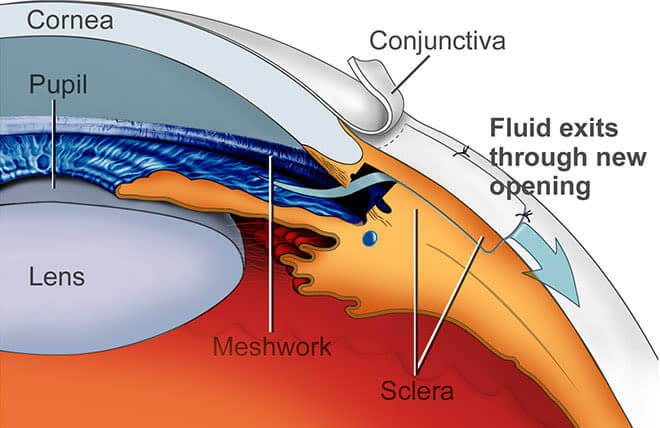
Glaucoma is a type of condition that damages the optic nerve, and it usually happens when the intraocular pressure of the eye increases. This is a progressive condition that leads to permanent loss of vision if not treated properly and timely.
Glaucoma surgery is the best way to treat this condition. The eye doctor makes a cut in the eye to reduce the fluid build-up and decrease the intraocular pressure. It depends upon the severity of glaucoma to recommend the best treatment method.
The best-proven way to treat glaucoma is to reduce increased eye pressure. When the IOP (intraocular pressure) becomes too high, it increases the risk of damaging the optic nerve permanently and surgery may be the only option, if glaucoma has critically impacted.
Some people are at higher risk of developing glaucoma. This includes:
If you develop glaucoma, you will be treated with medications initially. Surgery is needed when the pressure cannot be controlled with medicines. To prevent further damage and vision loss, the doctor will perform glaucoma surgery. Laser treatments are done when the patient does not show any result with primary medications. The surgical method is chosen after a thorough diagnosis of the patient’s glaucoma condition. The ophthalmologist determines the type of glaucoma one has developed before initiating surgical treatment.
Laser treatments are of different types depending upon the type of glaucoma you have. Laser Trabeculoplasty is a very simple method of treatment in which the eye surgeon will use laser technology to reduce the fluid build up in your eye and will drain it to decrease the IOP.
There are two types of laser treatments available for open-angle glaucoma:
Both these treatments are safe and do not have any noticeable side-effects. Doctors perform these treatments at their office on an outpatient basis.
If you have closed-angle glaucoma, then the doctor will perform different laser treatments. Laser Iridotomy is a method that is performed in patients with closed-angle glaucoma.
To understand the best treatment option for glaucoma, you need to consult an eye specialist.
The laser surgery outcome is not the same for every glaucoma patient. The result varies as per the condition and the severity of glaucoma that patient had. Laser surgery will stop further damage and will save your eyes from complete vision loss. Some patients get better vision after laser treatment. But some may require additional medications and treatments to reduce the IOP.
There are two other types of glaucoma surgery that is performed based on the condition of the eye and the glaucoma type. They are:
Glaucoma Implant–
This is a surgical treatment in which the doctor uses a drainage device to drain the built-up pressure inside the eye. This process involves implanting a tiny drainage device that sends the fluid down to a reservoir that the surgeon creates beneath the conjunctiva. From there the fluid is absorbed into the blood vessels nearby.
MIGS (Minimally Invasive Glaucoma Surgery) –
Patients with mild glaucoma are generally recommended for MIGS. This is a very successful glaucoma treatment that lowers the fluid pressure. This surgical method is faster and safer than other procedures. This surgical method is often used to treat the complications of other glaucoma treatments.
The doctor uses a microscopic device to make a very small incision in the eye to reduce the fluid pressure and treat the complications (if any).
What is Squint? Squint is a misalignment of the eye where the two eyes are pointed towards different directions. The misalignment may be constant for a few, while it may be intermittently occurring for some others. The deviation of the eye may...
Our eye is like a camera. The natural lens in our eye helps us to see the beautiful world around. But just as even a slight disturbance or an error in the camera lens can spoil the image, similarly when the lens...
Looking at a few misconceptions related to Glaucoma – The Vision Blinder A glaucoma is a group of eye diseases that lead to optic nerve damage and irreversible loss of vision. Many individuals fall prey to certain myths surrounding glaucoma. Let us...